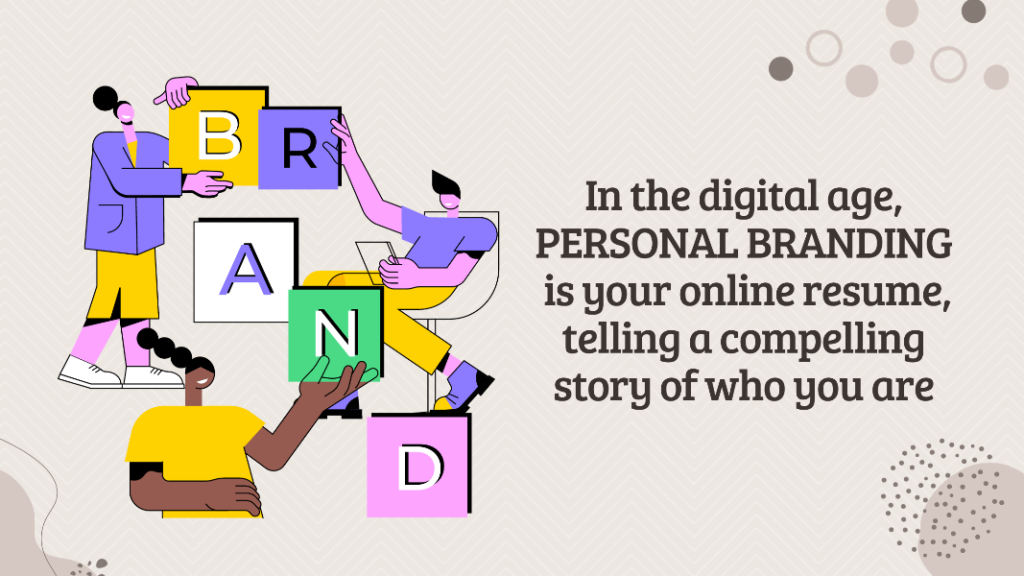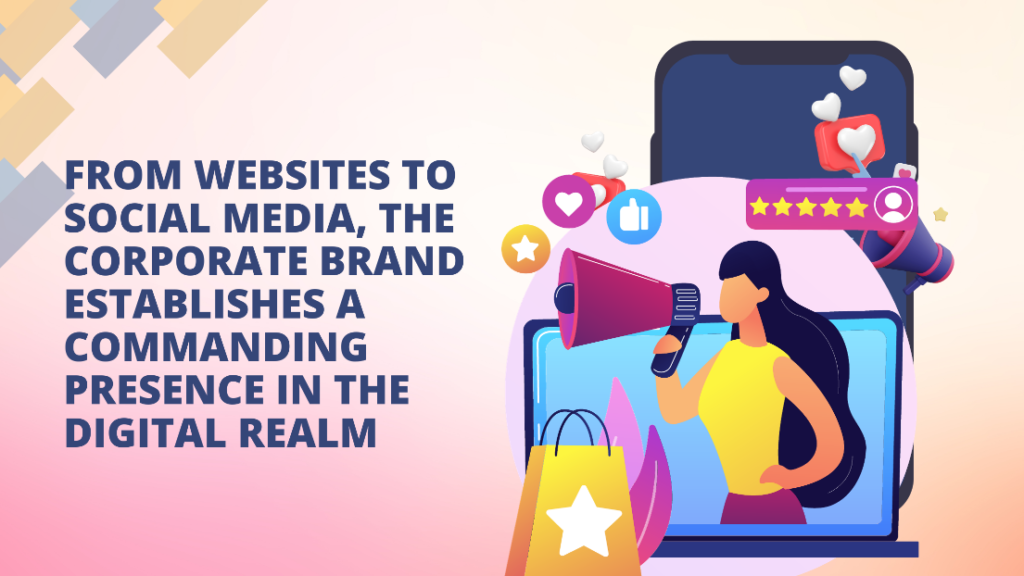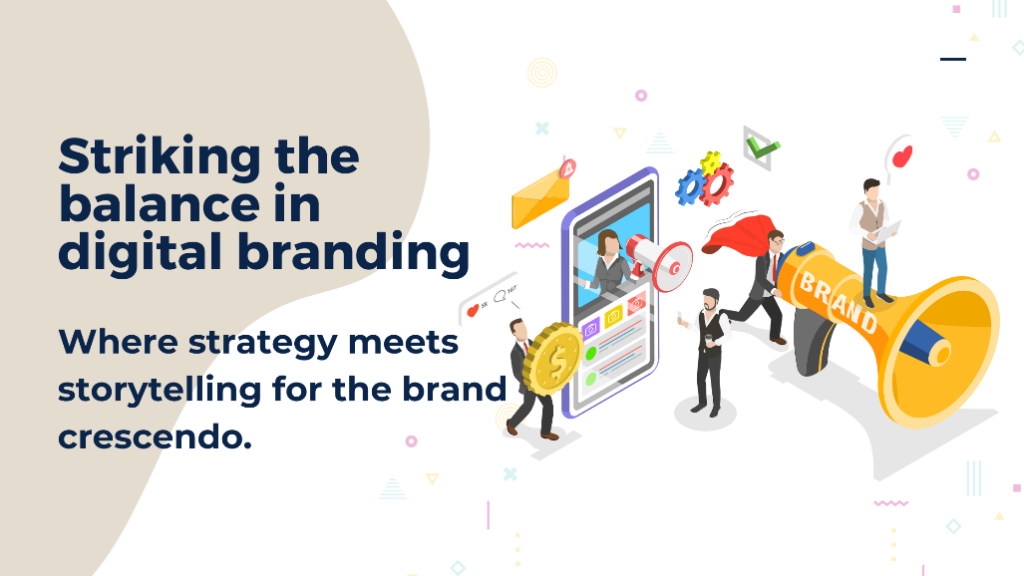Finding the Perfect Mix: Personal vs. Company Branding in the Online World

In the digital world, the battle between personal brand and corporate brand is ever-present. As businesses and individuals alike strive to establish a strong online presence, understanding the nuances of personal branding versus corporate branding becomes paramount.
In this blog, we’ll delve into the intricacies of these two branding approaches, exploring their respective merits and how they intersect in the digital marketing landscape.
What is Personal & Corporate Branding?
Corporate branding is the strategic effort to establish and enhance the identity of a corporation, fostering awareness, trust, and recognition among its target audience. It encompasses visual elements, messaging, and values to create a cohesive brand identity.
On the flip side, personal branding is the intentional and strategic cultivation of an individual’s public image. It involves defining and promoting one’s unique qualities, skills, and values to distinguish themselves in personal and professional spheres.
(Source:https://books.forbes.com/blog/personal-branding-vs-corporate-branding-why-you-need-both/)
The Power of Personal Branding in the Digital Age

In the digital age, personal branding has become a powerful force, and social media platforms have been essential to its success. Influencers and business professionals alike have used social media sites like Instagram, LinkedIn, and Twitter to build and promote their own brands.
Authenticity and Connection
Developing a sincere relationship with the audience is one of the main benefits of personal branding. Authenticity is key to digital marketing, and carefully constructed personal brands can connect with consumers on a deeper level. Since trust is the unit of account in the digital world, authenticity fosters trust.
Flexibility and Agility
Corporate brands may find it difficult to match the flexibility and agility that personal brands provide. People are nimble enough to quickly adjust to shifting fads and audience inclinations. This adaptability makes it possible to experiment quickly, which is crucial in the ever-changing field of digital marketing.
Influence and Thought Leadership
Influencers and thought leaders with the power to affect public opinion are frequently the result of personal brands. By utilizing their own brands, digital marketers may establish themselves as authorities in their industry and offer insightful commentary that draws a devoted audience. One can use this power to promote products, form alliances, and even collaborate.
Influence and Thought Leadership
Corporate brands continue to be the cornerstone of the commercial sector, despite the rise in popularity of personal branding.

The digital world has completely changed how businesses interact with their audience, and in order to succeed over the long term, they must have a strong online presence.
Credibility and Trust
Corporate brands hold intrinsic credibility and trust, especially if they have a history of delivering great products or services. Corporate brands frequently concentrate their digital marketing efforts on enhancing and strengthening this trust by highlighting message consistency and dependability.
Scale and Resources
Corporate businesses can implement extensive digital marketing strategies because of their size and resources. Corporate companies have the financial means to invest in a wide range of digital channels, catering to a wide range of audiences, from complex SEO strategies to massive social media campaigns.
Brand Consistency
Consistency in branding is essential for corporate organizations. Corporate brands’ digital marketing initiatives entail coordinating user experiences, messaging, and images across several platforms. By being consistent, a brand can develop a unified identity that appeals to customers and encourages brand memory and loyalty.
The Interplay: Where Personal and Corporate Brands Converge
Corporate and personal brands can coexist in the world of digital marketing. Rather, they frequently come together to form a dynamic interaction that can strengthen a brand’s overall visibility.
● Executive Branding
To increase the credibility of the corporate brand, executives and other leaders in a company might develop their personal brands. A CEO with a strong personal brand can help the audience relate to the firm better by humanizing it. Executive branding can be included into digital marketing tactics through interviews, thought leadership publications, and social media interaction.
● Employee Advocacy
Being the faces of a company, employees have a big say in how the brand is portrayed online. Using social media to promote and facilitate employee activism can help company messaging reach a wider audience. This not only increases the company brand’s visibility but also gives workers a sense of pride and community.
● Unified Content Strategy
A single content strategy is necessary to coordinate efforts in personal and business branding. This entails coordinating personal brand messaging and values with business entity values. Teams working in digital marketing can cooperate with individuals and departments to make sure that material on various channels tells the same story about the brand.
Striking the Balance: Crafting a Digital Branding Symphony
The balance between personal and corporate brands is essential in the digital marketing symphony. Finding the ideal mix guarantees a thorough and powerful brand presence.

The following tactics can help you strike this balance:
● Define Clear Objectives
Define specific goals for your company’s and your own branding initiatives. Having clear goals will help digital marketing efforts, whether they are centred around growing revenue, enhancing brand awareness, or establishing a leadership position in the field.
● Audience Alignment
Recognise your target market while launching business and personal branding campaigns. Make sure your messaging speaks to the unique requirements and tastes of every audience segment to deliver a consistent but customised brand experience.
● Collaborative Campaigns
Integrate personal and business brands through collaborative marketing. This could be using employee testimonials, marketing materials with executive profiles, or personal brand influencers endorsing business endeavours or items.
● Consistent Branding Elements
Ensure that the branding components used on personal and business platforms are consistent. Consistency in everything from colour schemes and logos to message tone promotes the overall identity of a business by fostering a sense of cohesion.
● Analytics and Iteration
Utilise data to gauge the success of individual and business branding initiatives. To continuously improve and iterate digital marketing tactics, track conversion rates, audience sentiment, and engagement data.
In the digital marketing world, the interaction between personal and corporate brands is not a zero-sum game. Instead, they collaborate like a great team, making each other better and stronger. A strong personal brand can add personality to a company, while a reputable corporate brand can provide individual influencers a strong platform.
Navigating this terrain, digital marketers need to understand the distinct advantages of corporate and personal branding. Businesses and individuals can establish a strong and long-lasting presence in the digital sphere by comprehending how they interact and putting strategies into place that take advantage of their unique advantages. Ultimately, the digital audience hears a melodious tune produced by the harmonious fusion of personal and corporate branding.
Hence, a personal brand might incorporate the same elements but it stretches to include the person, their skills, their qualifications and the beliefs and expectations their audiences attach to them.





